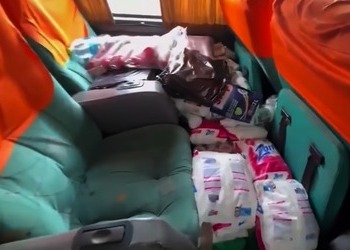Bus companies in Bolivia are eschewing carrying passengers for carrying a much more profitable cargo: contraband.
Over 1,000 passenger buses were caught smuggling contraband goods in Bolivia last year, according to a recent investigation by Bolivian newspaper La Razón.
The contraband network appears to be widespread, with more than 20 bus companies involved, Bolivia’s vice minister for the Fight Against Contraband, Brigadier General Daniel Vargas, told the newspaper. Yet penalties are low with companies offending for the first time facing fines of only $70.
Contraband is a long-standing issue in Bolivia, but it appears to be increasing. Last year, customs confiscated a record 737 million bolivianos (more than $105 million) worth of contraband goods, beating the record set the previous year and almost doubling the amount confiscated in 2020.
Below, InSight Crime considers how contraband has exploded in Bolivia, and why so many people have become reliant on it.
‘Ant Contraband’
“Ant contraband” (contrabando hormiga), whereby goods are illegally smuggled by individuals on a small scale, has been on the rise for a long time, Vargas told InSight Crime.
But the discovery of large-scale contraband smuggling by bus suggests that the problem goes beyond isolated cases and extends to organized operations involving smugglers, corrupt officials, and transport companies themselves.
SEE ALSO: Lake Titicaca: A Smuggler’s Paradise in Bolivia and Peru
The La Razón report found that bus companies involved in smuggling had become systematic in their operations: Some “passenger” buses were found to be completely empty of passengers, instead being used exclusively to transport goods. Ticket sellers and drivers now charge according to the goods being transported, and secret compartments are added to buses themselves.
The owners of the companies are well aware of what is happening, Vargas said.
“They are almost no longer interested in the number of passengers and in some cases the people who are engaged in smuggling hire the entire bus itself to put contraband merchandise inside,” he said.
Corruption Is Key
Corruption within the ranks of the authorities is vital for the continuation of contraband smuggling, the newspaper found.
La Razón reported that between January 2021 and November 2022, 163 members of the military had been investigated for allegedly assisting smugglers. Ten military members were arrested and five removed from their posts after being found guilty of asking for bribes from smugglers, stealing confiscated goods, and stealing contraband goods directly from the smugglers.
Vargas insisted that the government is dedicated to stamping out corruption. “The regulations currently in force are being applied to the maximum,” he said.
Ivan Paredes Tamayo, a journalist specializing in illegal economies in Bolivia, said the majority of graft goes unpunished.
“It’s like drug trafficking. In the fight against smuggling, there are corrupt officials and very few face justice. There are police and military who are part of these mafias and are not punished,” he said.
An Accepted Practice
La Razón found that the most popular route for contraband was from Yacuiba, a southern town on the border with Argentina, to the city of Santa Cruz, some 500 kilometers north.
SEE ALSO: Bolivia Seemingly Powerless to Stop Rampant Vehicle Smuggling
Contraband goods flow into Bolivia across each of its borders. To the west, smugglers move stolen vehicles in from Chile, while Lake Titicaca, a natural border between Bolivia and Peru, is a buzzing hub of contraband transfer: cocaine, fuel, mercury, and wildlife all move across its waters.
The buses, however, are carrying basic essentials used by almost all Bolivians. Argentine food products, cleaning products, vehicle lubricants, beer, pet food, canned goods, juices, energy drinks, and cookies are some of the most commonly smuggled merchandise.
A Growing Necessity
The growth in buses involved in contraband reflects a general expansion of Bolivia’s contraband trade. According to Vargas, the economic consequences of the COVID-19 pandemic and the devaluation of the Argentine peso, which affects commerce in certain Bolivian cities, have pushed a greater range of individuals into handling contraband.
“Smuggling has grown through the incorporation of these people who have lost their jobs,” Vargas said. The illicit economy now involves people who out of necessity have sought an alternative means of financial income, he added.
Smuggling activity increased with the pandemic and has not dropped since, said Paredes.
The Bolivian government has long struggled to tackle contraband and associated illicit economies with measures like increasing checkpoints and deploying drones in border regions. But some experts like Paredes believe more efforts are required.
“The authorities do what they can,” he said. “There are results, but they are not enough to eradicate smuggling. What is needed are tools to combat this crime: more ATVs, GPS, drones, and trained personnel to combat smuggling.”

